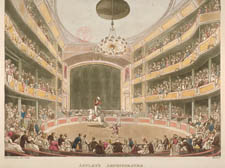 |
Victorian masses and leisure principle
Ruth Gorb talks to Judith Flanders about her latest book on leisure and pleasure in Victorian Society
Consuming passions:
Leisure and Pleasure in Victorian Britain
by Judith Flanders,
Harper Press, £20 order this book
THE consumer society, says Judith Flanders, starts here. With the Great Exhibition of 1851. It was launched, to the strains of the Hallelujah Chorus, as a celebration of a new definition of the good life, and it was about “things”. The quality of life was from now on measured by the number of possessions one owned.
The middle class came in their millions to the Crystal Palace not only to look but to buy the things that the Industrial Revolution had made possible and which through mass production were now being brought within their reach.
It was a lust for ownership that was looked upon as decent and acceptable: Ford Maddox Ford, founder of the Pre-Raphaelite movement no less, was known to say: “Much depends upon getting a house and adorning of a beautiful house.”
The significance of that house and its contents was a subject that intrigued Kentish Town-based author Judith Flanders and resulted in her 2003 best-selling book, The Victorian House.
Now, in Consuming Passions, she has produced what she sees as the natural follow-up. “What was happening outside the house, in the streets?” she asks.
“Residential streets are so empty now. In those days there were butchers’ boys and knife-grinders, the watercress girl and the rag and bone man, everyone going about their business on foot. And what were they all doing in their spare time, the people who lived and worked in those busy streets?”
They were, she discovered, doing much as they do today. Going to the theatre, shopping (a great deal of shopping), reading, travelling, going to the races and football matches. The difference was that it was the first time that all the fun was available to the masses – a phenomenon, says Judith Flanders, that was the result of a century of technological advances.
She gives just one simple, telling, example: “Travel by train, and you could read a book or a newspaper. There was no way you could have even seen a book while you were being shaken about in a stagecoach.”
Immersed in the Victorian era for some years now, she lives and works in a quiet side street in Chalk Farm. Despite what she calls “this funny accent” she was born in England, spent her childhood in Canada, and has been back in this country for 26 years. She has worked most of that time in publishing and journalism, but the direction of her life was changed some years ago when read a biography of Kipling.
She discovered that four daughters of a Methodist minister had all married remarkable men: Kipling, Burne-Jones, Baldwin, and Poynter, a president of the Royal Academy. Further research into these women’s lives was irresistible, and she wrote her first book, A Circle of Sisters. She had realised along the way how little she knew about 19th-century everyday life. She needed to find out.
The result was the runaway success of her next book, The Victorian House. Clever of her to hit the jackpot? “Of course we are interested in social history,” she says. “Our lives are not made up of great men or politics or kings and queens. Where does everyone go first when they visit a National Trust house? To the kitchen.”
And to the water-closet. Lynne Truss, in a review of The Victorian House, said, having found the chapter on the bedroom unexpectedly chaste, that the author was more “interested in S-bends than sex”. The same goes for Consuming Passions, says Judith Flanders to anyone who raises an eyebrow at the possibility of “pleasure” in Victorian Britain.
“There are already so many biographies and reminiscences about the period,” she says. “My book isn’t about personalities. It’s about how things worked, about how the world of technology and consumerism had changed the world of leisure.”
The face of shopping, for instance, was revolutionised by the arrival of gas-lighting and plate glass windows. The American Gordon Selfridge realised their potential, and by arranging his luxury goods in dazzling lighting had customers flocking to his doors in Oxford Street. What he had done, writes Judith Flanders, was to “create desire” simply by putting goods in the window.
She is evidently attracted by all things Victorian – would she like to have lived then? An unequivocal No. “Simply things like the fact that there was great excitement when a stagecoach took only four days to get to Manchester from London,” she says.
What is it that she finds so attractive about the period? “I’m tired of the image of the dour, grim Victorians,” she adds. “Just take the great engineer, Brunel; look at a picture of him and it’s hard to imagine anyone jauntier, and for good reason. It was a time for progress and a time for the middle classes.
“Yes, real glamour was for the very few, but stuff was becoming available to people whose ancestors wouldn’t have had cups or drunk tea. Yes, there was terrible poverty. But there were philanthropists working hard to make it better. Things were happening. And it is probably the last time the progress was seen as something completely optimistic.”
|


